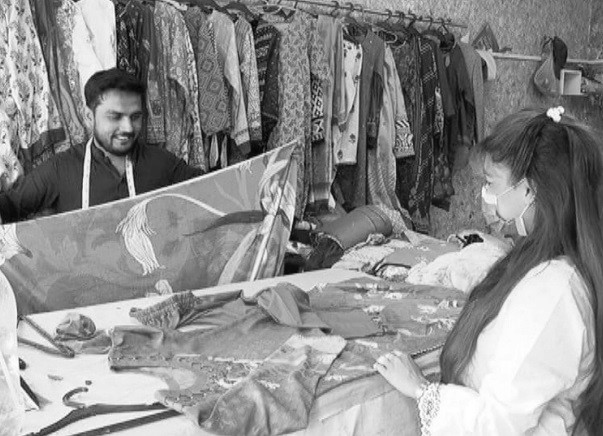
The effects of inflation have become prominent on women's tailors, with businesses saying they have seen as much as 30 per cent decline in work as compared to last year.
One of the major reasons driving down demand for stitched clothes among women is the increase in prices of the cost of stitching as well the raw materials. This is at a time when the country is dealing with record inflation and households are already struggling to maintain their way of life.
The dressmakers have increased the cost of stitching a women's dress for Eid by up to Rs200 this year. The industry is struggling in acquiring raw materials and managing demand and delivery due to the increase prices and disruptions in power supply. One tailor said that they aren't getting enough orders, a stark contrast from previous years when they were inundated and didn't have enough hours in the day.
"We don't think we are taking out the 'not taking orders' board this year," said one tailor who specialises in sequined dresses. The buyers are also facing the same challenges. One woman said that she was getting only one dress stitched for herself while two each for the children this year as she was struggling to manage expenditure. Meanwhile, small time tailors who work out of their home are getting more work. These seasonal workers charge less than businesses that operate all year round.
The Express News conducted a survey which revealed that tailors who had been visiting the city in the past, including from rural Sindh, no longer had work. Their customers were switching to pret or ready-to-wear clothes. A plain dress which was stitched at Rs800 has now increased to Rs1,000 in Ramazan, while for a decorative hemline, it increases to Rs.1,200. Tailors in upscale areas have increased prices further.
Tanveer Ahmed, a tailor in Nazimabad, said that the price of elastic, which was Rs250 was now upto Rs350, Rs60 chalk became Rs150, and Rs.40 bukram was sold at Rs.70. The prices of buttons, thread, lace, needle, silk have also doubled. However, the numbers of customers are not increasing at the same pace, they said. Last year, Tanveer's junior workers had to work up to 14 hours a day to meet the target.
This year, he has the same number of people but fewer orders. Amjad Abbasi, who works in the Scheme 33, said that they try to take as many orders as much as they can deliver on time during Ramazan. He said that the increase in demand for pret was due to the price increase. Amjad expects that the customers would grow during the second half of Ramazan. However, he added, then there would be less time to get them ready. "Then, when something goes wrong, the customers get angry," he added. Amjad acknowledged that the option to order ready-to-wear clothes online had also played in the decline in demand for stitched clothes. "Some people like the convenience and want to avoid the hassle of the market," he said.
Atiya Nawab, a resident of Safora, said that she got her Eid dress stitched from a tailor in her area. "In Ramazan, tailors increase prices and do not even pay proper attention due to the volume of orders," she said. She said that her tailor was a self-styled 'fashion designer' who didn't get the size right in her dress. "When I pointed it out, the tailor made an excuse saying there wasn't enough fabric," she said. Atiya said she had to get it altered from a different tailor. Sanam, a resident of Scheme 33, complained that during Ramazan, tailors would often forget instructions during the month of Ramazan.
"Last year, the lace was attached at the wrong place and the sleeves were long," she said. She said that she prefers her old tailor who would make sure he noted down everything.
Carving a niche
Even as women's tailors struggle, those who are sewing at home and have cultivated a reputation continue to be flooded with orders. Faria Khan says her tailors would often tell her that they didn't have time or cite power outages, especially during Ramazan.
She now gets her dresses stitched from a woman who works out of her home. "Her prices are also reasonable and she delivers the suit on time," she said. Zeenat, a woman who stitches at home, said that she stitches in Ramazan every year and earns up to Rs10,000 per day. She delivers orders till the eve of Eid (chand raat) and then stitches clothes for her family.

















COMMENTS
Comments are moderated and generally will be posted if they are on-topic and not abusive.
For more information, please see our Comments FAQ